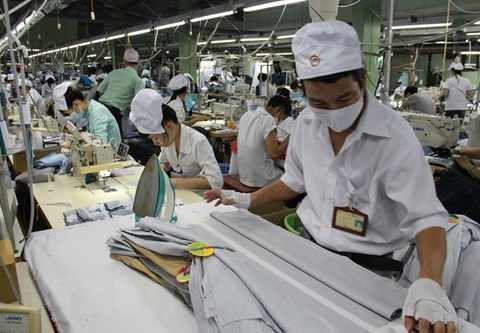- © Copyright of Vietnamnet Global.
- Tel: 024 3772 7988 Fax: (024) 37722734
- Email: evnn@vietnamnet.vn
Personal income tax
Update news Personal income tax
VN ramps up supervision on personal income tax
Vietnamese authorities are ramping up tax supervision on individuals who earn income from livestreaming sales on e-commerce and social media platforms to ensure they comply with tax regulations.
Personal income tax collections fall for first time in 10 years
The revenue from personal income tax (PIT) witnessed a minus growth rate in the first three months of the year for the first time in the last 10 years. However, PIT collections still account for a large proportion of the total state budget revenue.
Outdated PIT weighs on those struggling to make ends meet in major cities
It is urgent for Vietnam to amend the regulations on personal income tax (PIT), which have proven to be outdated and weighing on people, especially those struggling to make ends meet in major cities.
Vietnam to amend law on personal income tax
The amendments to the PIT law would be studied and considered carefully to ensure the consistency with the tax system reform strategy to 2030, appropriateness to the socio-economic context, income and living standards of the people.
Should the personal income tax law be amended before 2026?
While analysts and workers hope the personal income law (PIT) will be amended as soon as possible, the Ministry of Justice (MOJ) says it plans to amend the law in 2026.
PIT Law to be amended in 2026
The government is considering amending the personal income tax (PIT) law while preparing a program on laws and ordinances in 2025.
Tax Law in Vietnam inconsistent with income
The Law on Personal Income Tax aims to create fairness in all incomes of society.
E-commerce platforms to be connected with tax agencies from next year
E-commerce platforms must be electronically connected with tax management agencies from the beginning of next year, not from next month, as the tax watchdog aims to better collect taxes from sellers operating on the platforms.
Collection of tax from online business becomes easier
More and more Vietnamese individuals with businesses online have declared tax and paid personal income tax.
Vietnamese-made games now played around the world
To create a level playing field and help Vietnamese develop games reach the world market, it is necessary to have more reasonable policies, experts say.
Vietnamese mobile app creator reports revenue of $14 million in 2020
The Cau Giay district taxation agency in Hanoi has reported that a 28-year old woman earned revenue of VND330 billion, or $14 million, in 2020 and paid personal income tax of VND23.4 billion.
Hanoian girl pays over VND23 billion in income taxes on app development
A 28-year-old girl from Hanoi last year paid VND23.4 billion (over US$1 million) in income taxes from her app development job, according to the Hanoi Tax Department.
Tax cuts proposed for SMEs to accelerate growth after COVID-19
 The Ministry of Planning and Investment has asked for corporate income tax (CIT) to be cut for small and medium-sized enterprises (SMEs) by half this year in an effort to boost growth when the COVID-19 pandemic eases.
The Ministry of Planning and Investment has asked for corporate income tax (CIT) to be cut for small and medium-sized enterprises (SMEs) by half this year in an effort to boost growth when the COVID-19 pandemic eases.
VN Finance Ministry proposes 5-month extension of VAT and land rent payment for businesses
 The Ministry of Finance has submitted to the Government a five-month extension of value-added tax (VAT), personal income tax and land rent fee payments for those affected by the COVID-19 epidemic.
The Ministry of Finance has submitted to the Government a five-month extension of value-added tax (VAT), personal income tax and land rent fee payments for those affected by the COVID-19 epidemic.
Vietnam Finance Ministry plans relief for taxpayers
 A higher disposable income as a result from the adjustment would boost household spending and economic growth, said the Ministry of Finance.
A higher disposable income as a result from the adjustment would boost household spending and economic growth, said the Ministry of Finance.
Taxation agencies try to collect tax from YouTubers, Facebookers
 Taxation agencies struggle to find individuals who have income from YouTube and Facebook, but have had some recent success.
Taxation agencies struggle to find individuals who have income from YouTube and Facebook, but have had some recent success.
Vietnam vows to force YouTubers to pay tax
 The tax rate that Vietnam levies on YouTubers is 7 percent, much lower than other countries.
The tax rate that Vietnam levies on YouTubers is 7 percent, much lower than other countries.
Personal income tax rates out of date, need amending
 The Ministry of Finance (MOF) says that personal income tax (PIT) rates have become out of date after six years of application and need amendment.
The Ministry of Finance (MOF) says that personal income tax (PIT) rates have become out of date after six years of application and need amendment.
Foreign experts favor Vietnam labor market: survey
Vietnam is one of the most attractive destinations for foreign workers because of the high post-tax income and low expenses for accommodations and meals.
Phu Quoc Island projects lay idle
More than 100 hospitality and entertainment projects on Phu Quoc Island with the combined pledged capital of around $6 billion have been licenced, but few have been carried out due to underdeveloped infrastructure and the high cost of labour.



















